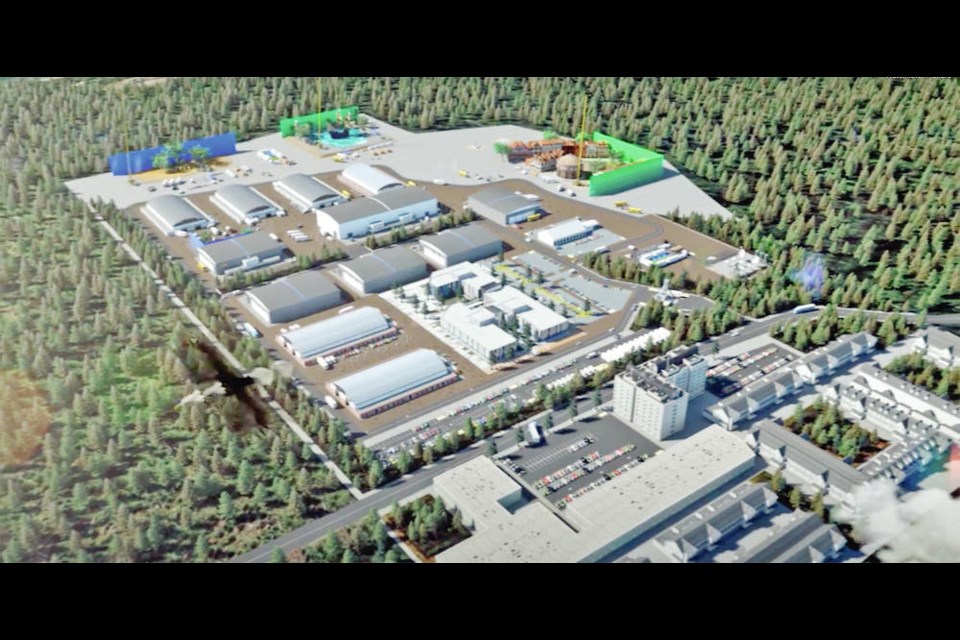The film company behind plans for a $300-million film studio with six sound stages and a commercial complex on Malahat First Nation land says investors are ready to sign off on the project.
Beverley Dondale, CEO of Victoria-based Alpha Select Production Services, said the First Nation is awaiting federal funds for a feasibility study that will determine construction timelines and risk analysis for the project near Mill Bay.
Dondale said major investors from Canada and the U.S. are committed to financing the massive construction project on an 80-acre parcel that would also include a business and industrial park, a 120-room hotel, a shopping village and a technical academy for film apprenticeships and skills training.
Dondale did not identify the investors, but said announcements, including a timeline for the project, will be made early in the new year, after the feasibility study is complete.
“This is not a pipe dream … this has been in the works for many years,” Dondale said in an interview Wednesday.
“I have all the players to make it possible, especially the studio portion — [people] who are experts and have done it before. Once we have the feasibility study, the investors I’ve had hiding in the woodwork will come out.”
The project would be a one-stop shop for major film companies, said Dondale, with one of the key features being massive water tanks in one of the buildings that would attract movies with nautical themes.
Proponents say the studio project could provide up to 1,500 jobs and provide a bustling commercial centre, something the Malahat Nation covets.
The film industry on Vancouver Island is having one of its best years on record, with $49.2 million in direct spending, despite the pandemic — more than double the $22 million in spending the previous year.
But the Victoria Film Commission has argued that lack of major studio space and sound stages — 18,000-square-foot buildings with 40-foot ceilings where any scene can be created — has limited the industry’s growth here.
Film commissioner Kathleen Gilbert said with major sound stages and studios, the Island could go from films with budgets of $1 million to $10 million to those in the $20-million to $200-million range.
A water-tank studio would be a first for Canada, and put Malahat on the A-list, she said, adding the partnership with Malahat First Nation would also be a big plus. “In Hollywood right now, it’s all about being green and being inclusive,” she said.
Josh Handysides, chief administrative officer of the Malahat Nation, said Malahat Film Studios would produce revenue from the studios, hotel and industrial park as well as tax revenue from the project, while providing training and jobs.
“When looking at investment opportunities, we look to find opportunities which support a vibrant economy for the Malahat Nation,” Handysides said. “We believe this project is of the size that is required to actually have a studio on Vancouver Island succeed. It will be big enough to attract companies to locate permanent facilities and businesses here with us.”
Handysides said the Malahat Nation is eager to diversify its economy, which includes developments at the Bamberton industrial site, the Malahat Skywalk tourist attraction now under construction, and other retail and housing developments on its lands.
The Malahat also partnered with an energy company for a floating liquefied natural gas plant at Bamberton, but scrapped the plan in late 2017.
Dondale said the partners hadn’t planned on going public with the film-studio plan, but tipped their hand this week because the process included getting support from the Cowichan Valley Regional District.
Staff at the regional district recommended support for the project, saying it has the potential to be a major economic driver by attracting investment, employment and training opportunities.
Dondale said land was key to finally securing a major film studio for the island, and the Malahat Nation have been willing partners.
She said a significant part of the proposal is technical training that will supply the studio with skilled workers such as gaffers, riggers and lighting personnel.
“When the Vancouver film industry blew up, they had the hiccup of not having people in those entry-level positions in place,” said Dondale. “We’re on an Island, so we need to have people trained up so we can have incredible crews to match a world-class facility.”
Dondale personally financed a cultural survey of the Malahat First Nation property two years ago to make sure construction would not disturb any potential remains or artifacts.
Her company, Alpha Select, has been active in the film industry for years, producing films, securing sound stages and filming sites and providing wardrobe, props and accommodation for crews.
“I guess I’m known for finding stuff and making things happen,” she said.



